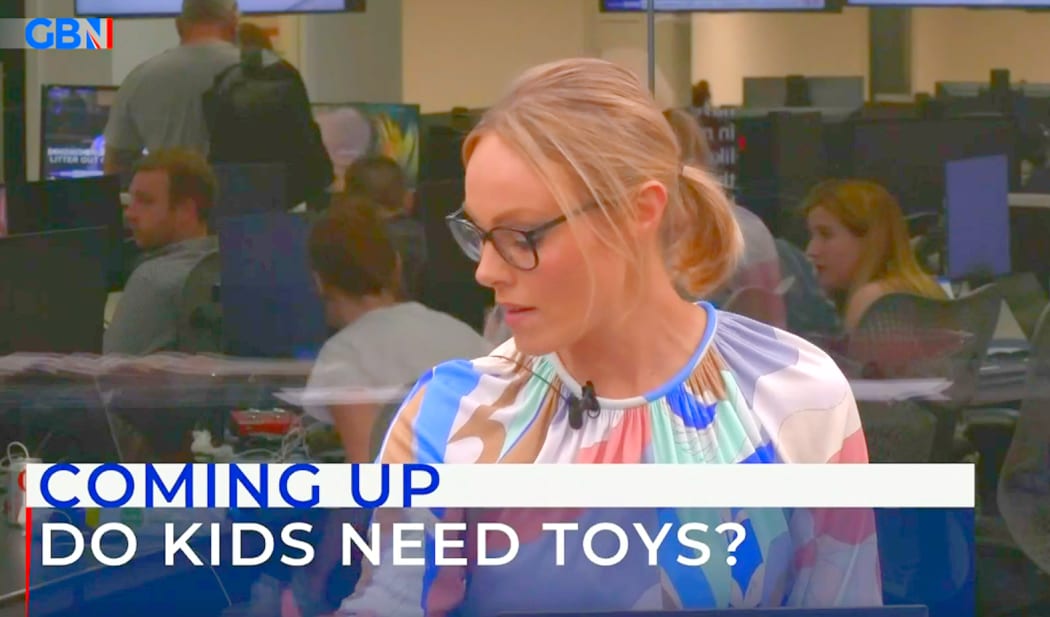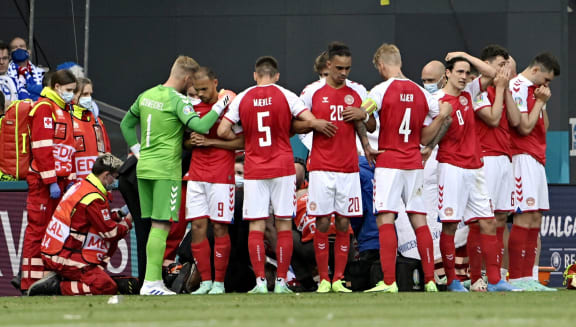Mediawatch’s weekly catch-up with Lately. Colin Peacock talked to Karyn Hay about the launch of the new news channel labelled ‘Fox News for the UK,’ the bike bridge beat-up that’s still creating comment - and how a football game turned into a life and death dilemma for broadcasters.

Interesting talking point on brand new 'anti-woke' UK TV channel GB News Photo: screenshot
Matter of of life and death

Photo: Copyright reserved
On Sunday Christian Eriksen collapsed and had to be revived on the pitch during a European football championship Denmark vs against Finland game.
Players quickly rushed around him and called for medical staffers who giving him CPR and defibrillation. The whole scene unfolded before a stunned crowd - including his partner on the sidelines - and it was also broadcast live on TV.
It gave broadcasters a huge dilemma. Should they show the ghastly scenes? Keep broadcasting but turn the cameras away? Cut the feed altogether?
One Danish broadcaster which had its own outside broadcast changed to a long overhead shot of the the stadium once it was clear the scenes were upsetting.
But US-based ESPN was criticised for carrying on the footage all the way through to the suspension of the game after Erikson had been stretchered away.
Commentator Derek Rae tweeted this:
But Derek Rae was in a terrible position. He couldn't just stop talking unless told to.Afterwards he told sport site The Athletic he just doesn’t want to know about any of it and never wats too see thee images again.
BBC TV in the UK was criticised for carrying live coverage for 13 minutes after the collapse before finally cutting back to their studio where the shocked hosts and pundits found it difficult to do their jobs.
The BBC’s Football Daily podcast for the day was a simple 40-second message which said it didn't feel right to talk about football on that day.
However the Football Weekly podcast from the Guardian in the UK decided to talk about it a lot - and the ethics of showing it.
One of the team doing the live blog of the match was almost in tears talking about the stress of it. Danish journalist Lars Sivertsen said when asked to go the radio he felt like he was “talking about a man perishing in front of their eyes - and it felt very wrong."
French football reporter Philippe Auclair - who saw something similar happen a few years ago when a game was abandoned - said as journalist, he felt it must be reported, but he couldn't do it:

"Denmark lost, Life won" - Danish paper headline last Monday. Photo: screenshot / YouTube
“Things can be terrible but you have to show them. You have to harden your eyes but not your heart. But after 5 minutes I turned the TV off. I couldn’t take it and I felt guilty by association.”
Broadcasters turn away from all kinds of pitch invaders these days - including streakers - because to give them the ‘exposure’ they’re looking for is disruptive.
These days the threat of organised violence terror attack or politically-inspired disruption must be part of the planning for major events - and so should a possible medical tragedy on the pitch.
While some people hated cameras and lenses zeroing in on the incident - the reason the players formed a circle around the medical team reviving him - a Reuters photographer took a photo at that moment which seemed to show him conscious and raising his hand on the stretcher.
That was intrusive - but it reassured many people that Eriksen was alive - so no bad thing?
New UK channel launches to ‘poke the woke’
The backers and founders of ‘GB News’ - which launched on Monday morning our time - strenuously insisted beforehand it is non-ideological.
It is anchored around what they say will be “appointment-to-view programming” with personality hosts.
The driving principle - according to founding editor Andrew Neil, a respected veteran journalist and broadcaster - is that the mainstream media is biased and too elitist to represent the opinions and concerns of most Britons.
He told the BBC Media show he’ll show the way with his own show on the channel - including a Mediawatch segment. (no sign of that yet though).
New Zealand-born billionaire Christopher Chandler has been named as a backer of GB News and one of the key hosts is New Zealander Dan Wootton, who cut his teeth in showbiz for Murdoch’s UK papers, then a highly-opinionated talk radio host broadcaster.
His first guests on GB News were Nigel Farage, anti-lockdown campaigner Lord Sumption, UK Apprentice host Lord Alan Sugar -- all millionaires and all voices that not are hard to find in the rest of the UK media
Early days, but this a really really bad watch. Uncomfortable, even.
It looks like they have launched before it is ready. Terrible dark studio, awful sound. The presenters are ill at ease.
Honey Monster ranting in a shipping container. Sounds accurate. https://t.co/fQdKBnywjz
— Ingrid Kopp (@fromthehip) June 14, 2021
On Day One most of the content was replays of Andrew Neil interviewing the other hosts of the new shows about how they will present their own shows: It went on and on like that for hours . . .
I checked back in to the main morning show on Tuesday and its four hosts were talking among themselves about current talking points.
They seemed really pleased that 'GB News' was trending on Twitter - but so was ‘Gammon,’ which is a British political insult mocking people who rant opinions til their face flushes resembling the pork product of the same name.
Lots of it isn't really ideological because it’s just chat about trivia, but there was a strong editorial line yesterday urging Boris Johnson to ‘give them freedom’ and lift Covid restrictions. (That didn’t work - they were extended by a month yesterday).
Andrew Neil’s promise there would be no fake news didn't reach Dan Wootton.
His opening monologue was a rant about the Covid restrictions, urging viewers to “fight back” against “doomsday scientists” who had “terrified the public into supporting lockdowns”.
Journalists - like BBC's Nick Watt - are now facing harassment in public from anti-lockdown people like this:
This is horrifying. Nick Watt is such a decent guy. pic.twitter.com/fsAc7JeH5k
— Tim Walker (@ThatTimWalker) June 15, 2021
So far it has attracted an audience, curious to check out the new channel. Predictably cheerleaders on the right-wing have welcomed it, while lefties have slammed it.
The right-leaning Daily Telegraph said it was beset by glitches but “there was no sneering, no talking down and no patronising.” It gave GB News four out of five stars.
The left-leaning Guardian’s critic gave it one out of five stars.
“The opening night felt like the furthest thing from appointment TV imaginable. I give it a year,” said reviewer Stuart Jeffries.
Donors and backers must be prepared to lose money on what is essentially a political project.
Independent analysts Enders Media said it’s a marginal proposition business-wise - especially as it wants viewers to be paying supporters.
“Its own linear audience and paying member forecasts are optimistic for a service with limited prominence and a streamlined budget, though profitability may not be its only measure of success.”
Wired magazine reckoned success would actually be online for GB News.
“If GB News aims to stir up the culture war, yet will have low viewing figures, then it will have to gain relevance via social media. Expect to see lots of viral clips of Andrew Neil vivisecting underprepared leftists over the coming months.”

